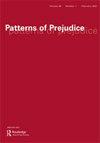海德格尔与种族
IF 0.8
2区 社会学
Q4 ETHNIC STUDIES
引用次数: 1
摘要
摘要在本文中,沃林试图澄清一个关于海德格尔支持国家社会主义的哲学基础的根本误解。以前的许多文献都认为,作为存在主义哲学的倡导者,海德格尔在认识论的基础上反对纳粹主义。海德格尔的捍卫者坚持认为,由于纳粹世界观是建立在“生物种族主义”的基础上的,而且海德格尔是现代科学的坚定批评者,因此他的登哈比图与纳粹信条之间存在着不可逾越的鸿沟。然而,仔细研究纳粹种族主义的基本原则表明,它与“科学主义”几乎没有共同点。相反,种族思维是一种内在的意识形态建构,在与19世纪实证主义的争论中出现。因此,它充满了神秘主义和唯灵主义的元素。最终的结果是德国浪漫主义、终极密教(Ariosophy)、雅利安至上主义和俾斯麦主义的混合,虽然混乱,但却非常有力。从根本上讲,纳粹的“种族科学”是形容词中的矛盾,是现代政治神话的典范。作为“神话”,它不受“科学发现逻辑”的习惯经验和学科约束。此外,海德格尔关于种族思想的观点并不是单方面否定的。在《黑色笔记II–VI》中,他称赞“种族是历史这个存在的必要条件和中介条件”。从根本上讲,海德格尔对“精神种族主义”的辩护与汉斯·根特和路德维希·费迪南德·克劳斯等纳粹理论家对种族思想的理解之间几乎没有质的区别。哲学家、海德格尔的学生卡尔·勒维斯认为,海德格尔不仅是“德国革命”的杰出代表;他比Ernst Krieck或Alfred Rosenberg激进得多本文章由计算机程序翻译,如有差异,请以英文原文为准。
Heidegger and race
ABSTRACT In this article, Wolin attempts to clarify a fundamental misunderstanding concerning the philosophical grounds of Heidegger’s support for National Socialism. Much of the previous literature has assumed that Heidegger, as an exponent of Existenzphilosophie, opposed Nazism on epistemological grounds. Heidegger’s defenders maintain that, since the Nazi world-view was predicated on ‘biological racism’, and since Heidegger was an inveterate critic of modern science, an unbridgeable gulf separated his Denkhabitus from the Nazi credo. However, careful scrutiny of the basic tenets of Nazi race doctrine indicates that it had very little in common with ‘scientism’. Instead, race thinking was an inherently ideological construct that emerged in polemical opposition to nineteenth-century positivism. As such, it was saturated with mystical and spiritualist elements. The end result was a confused, yet highly potent, amalgam of German romanticism, fin-de-siècle esotericism (Ariosophy), Aryan supremacism and Bismarckian Machtpolitik. At base, Nazi ‘race science’ was a contradictio in adjecto, a paradigmatic instance of modern political myth. As ‘myth’, it was untethered by the customary empirical and disciplinary constraints of the ‘logic of scientific discovery’. Moreover, Heidegger’s views on race thinking were far from unilaterally negative. In the Black Notebooks II–VI, he praised ‘race [as] a necessary and mediate condition of historical Dasein’. Fundamentally, there are very few qualitative differences between Heidegger’s defence of ‘spiritual racism’ and the understanding of race thinking propagated by Nazi ideologues such as Hans F. K. Günther and Ludwig Ferdinand Clauss. According to the philosopher and Heidegger student Karl Löwith, Heidegger ‘was not merely a distinguished representative of the “German revolution”; he was so in a manner much more radical than Ernst Krieck or Alfred Rosenberg.’
求助全文
通过发布文献求助,成功后即可免费获取论文全文。
去求助
来源期刊

Patterns of Prejudice
Multiple-
CiteScore
2.50
自引率
0.00%
发文量
11
期刊介绍:
Patterns of Prejudice provides a forum for exploring the historical roots and contemporary varieties of social exclusion and the demonization or stigmatisation of the Other. It probes the language and construction of "race", nation, colour, and ethnicity, as well as the linkages between these categories. It encourages discussion of issues at the top of the public policy agenda, such as asylum, immigration, hate crimes and citizenship. As none of these issues are confined to any one region, Patterns of Prejudice maintains a global optic, at the same time as scrutinizing intensely the history and development of intolerance and chauvinism in the United States and Europe, both East and West.
 求助内容:
求助内容: 应助结果提醒方式:
应助结果提醒方式:


